Wasted chicken feed drives me nuts and I was determined to build a feeder that would put an end to chickens billing feed out onto the ground. After much research, contemplating dozens of designs and several iterations of my own, I am now happy with my PVC feeder. There are no longer piles of wasted grain on the floor, which makes me, my chickens and my feed budget happy. Mine cost approximately $12.00 to build and was finished in 20 minutes.
This is the finished feeder in my “Little Deuce Coop.” Side view of the feeder.MATERIALS LIST:
A PVC pipe or irrigation tubing, cut to the length that will fit your chosen location. (I used a 4″ wide pipe for the feed and a smaller one for the oyster shell, various sizes will work)
A PVC pipe cap for the top. (I used a 4″ cap, found in plumbing section of Home Depot)
A high corner litter pan
A piece of scrap wood
Extra long zip ties
3 screws
3 washers
A drill
LET’S MAKE IT!
- Drill four holes in the pipe, two on each side where they will align with holes in stud. (see photo above)
- Drill two holes through the stud at measured increments that mirror the holes in the pipe. ( photo below)
- Mark where the “feed dish” will be mounted. The pipe should sit approximately 1/4″-1/2″ above the bottom of the feed dish. If the dish is too close to the bottom of the pipe, the feed will not flow out into the dish.
4. Secure the scrap piece of wood to the stud with screws and washers. (as shown below)
For an oyster shell or grit dispenser:
- Pre-drill one hole in a PVC pipe cap . Cap should be two inches wider than the pipe.
- Secure the pipe cap to the stud with a screw and washer.
For a feed dispenser using a corner litter pan for feed:
- pre-drill two holes in the back of the litter pan where it will mount to the stud. Space them so that the washers align one above the other
- Secure the corner litter pan to the stud with screws and washers.
- Thread a zip tie through the two holes in the pipe and then the two holes in the stud and secure the zip tie to itself.
- Do the same for the second set of holes in the pipe and stud.
*NOTE: If installing feeder in the run, be sure to securely cover it at dusk to guard against rodents.
Click here for more tips on rodent control in and around the coop.**
Kathy Shea Mormino
Affectionately known internationally as The Chicken Chick®, Kathy Shea Mormino shares a fun-loving, informative style to raising backyard chickens. …Read on


shop my SPONSORS
Wasted chicken feed drives me nuts and I was determined to build a feeder that would put an end to chickens billing feed out onto the ground. After much research, contemplating dozens of designs and several iterations of my own, I am now happy with my PVC feeder. There are no longer piles of wasted grain on the floor, which makes me, my chickens and my feed budget happy. Mine cost approximately $12.00 to build and was finished in 20 minutes.
This is the finished feeder in my “Little Deuce Coop.” Side view of the feeder.MATERIALS LIST:
A PVC pipe or irrigation tubing, cut to the length that will fit your chosen location. (I used a 4″ wide pipe for the feed and a smaller one for the oyster shell, various sizes will work)
A PVC pipe cap for the top. (I used a 4″ cap, found in plumbing section of Home Depot)
A high corner litter pan
A piece of scrap wood
Extra long zip ties
3 screws
3 washers
A drill
LET’S MAKE IT!
- Drill four holes in the pipe, two on each side where they will align with holes in stud. (see photo above)
- Drill two holes through the stud at measured increments that mirror the holes in the pipe. ( photo below)
- Mark where the “feed dish” will be mounted. The pipe should sit approximately 1/4″-1/2″ above the bottom of the feed dish. If the dish is too close to the bottom of the pipe, the feed will not flow out into the dish.
4. Secure the scrap piece of wood to the stud with screws and washers. (as shown below)
For an oyster shell or grit dispenser:
- Pre-drill one hole in a PVC pipe cap . Cap should be two inches wider than the pipe.
- Secure the pipe cap to the stud with a screw and washer.
For a feed dispenser using a corner litter pan for feed:
- pre-drill two holes in the back of the litter pan where it will mount to the stud. Space them so that the washers align one above the other
- Secure the corner litter pan to the stud with screws and washers.
- Thread a zip tie through the two holes in the pipe and then the two holes in the stud and secure the zip tie to itself.
- Do the same for the second set of holes in the pipe and stud.
*NOTE: If installing feeder in the run, be sure to securely cover it at dusk to guard against rodents.
Click here for more tips on rodent control in and around the coop.**



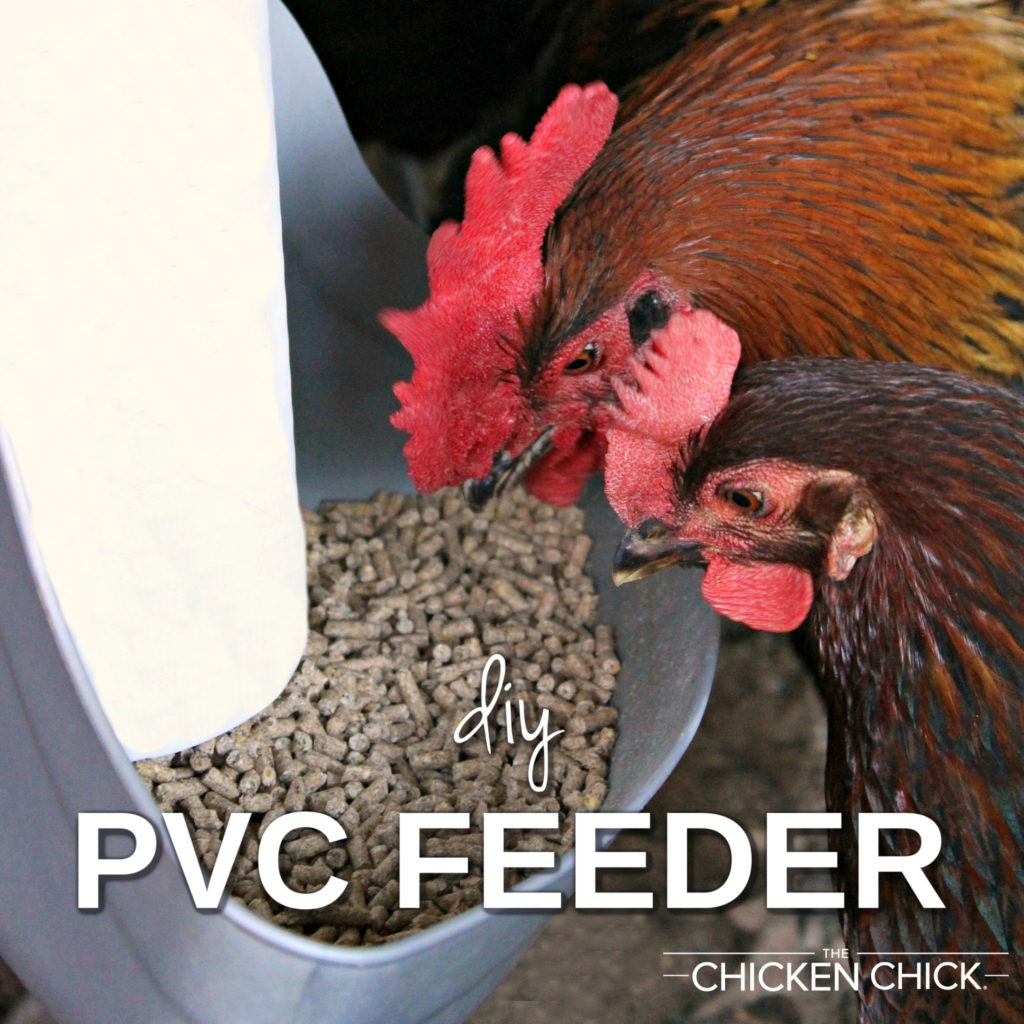
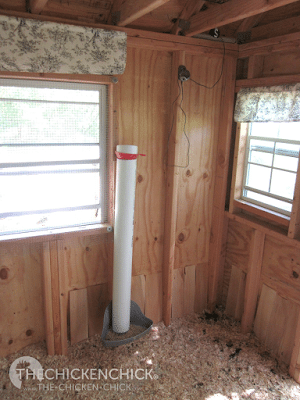
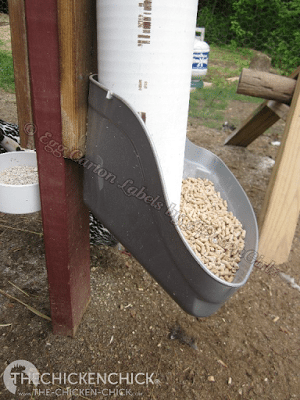
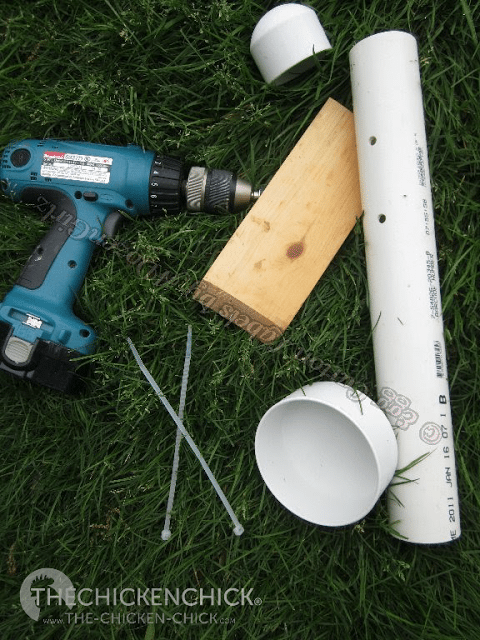
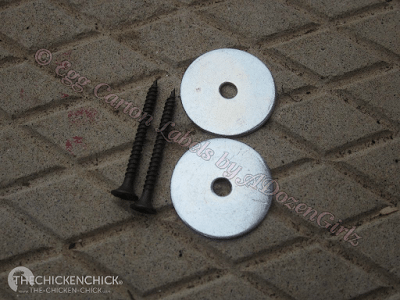
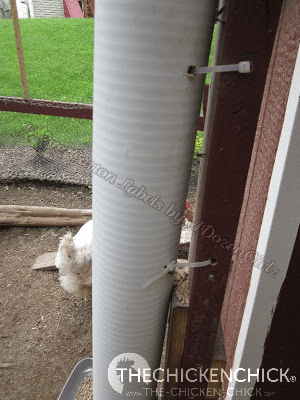
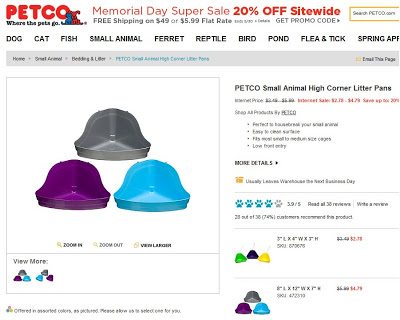
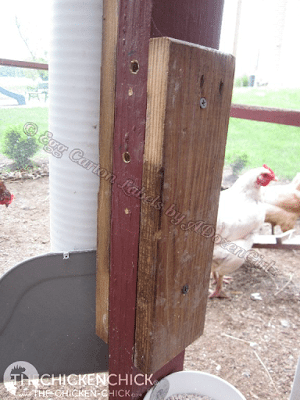
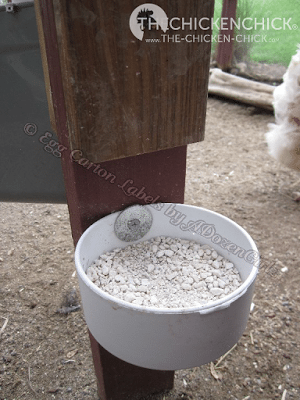
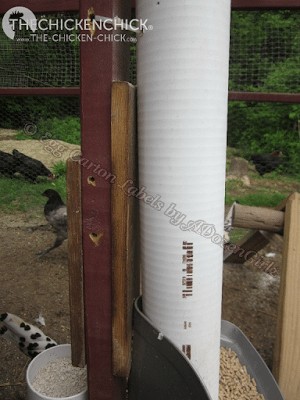
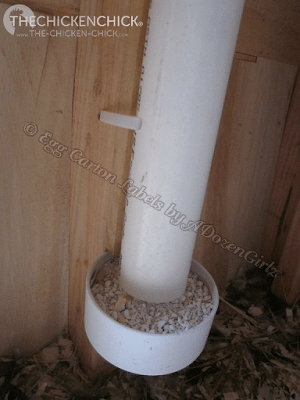
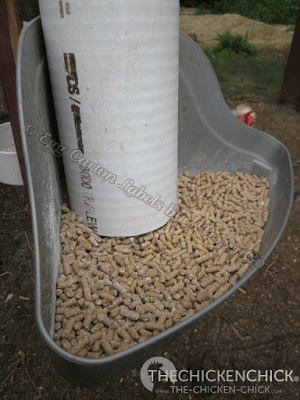
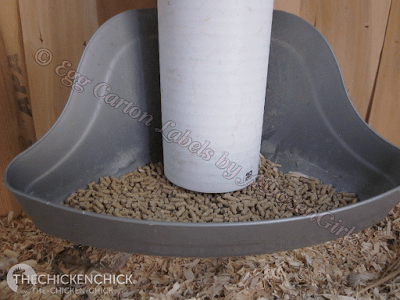
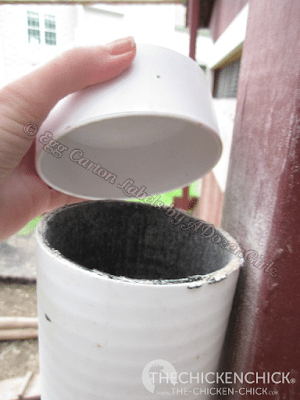
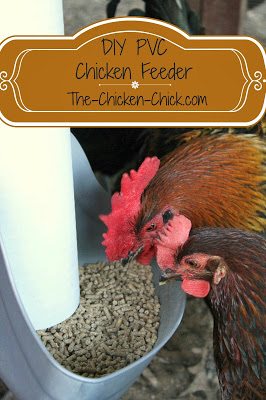













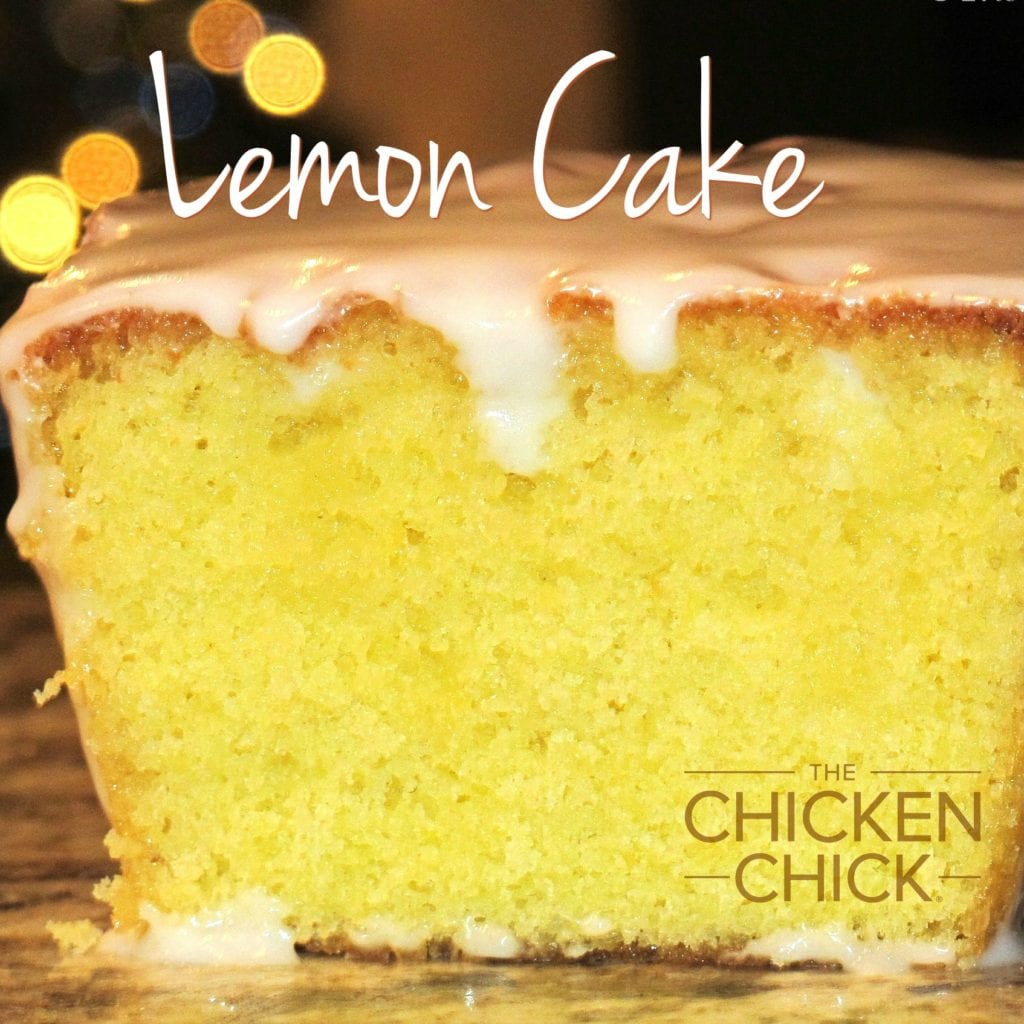
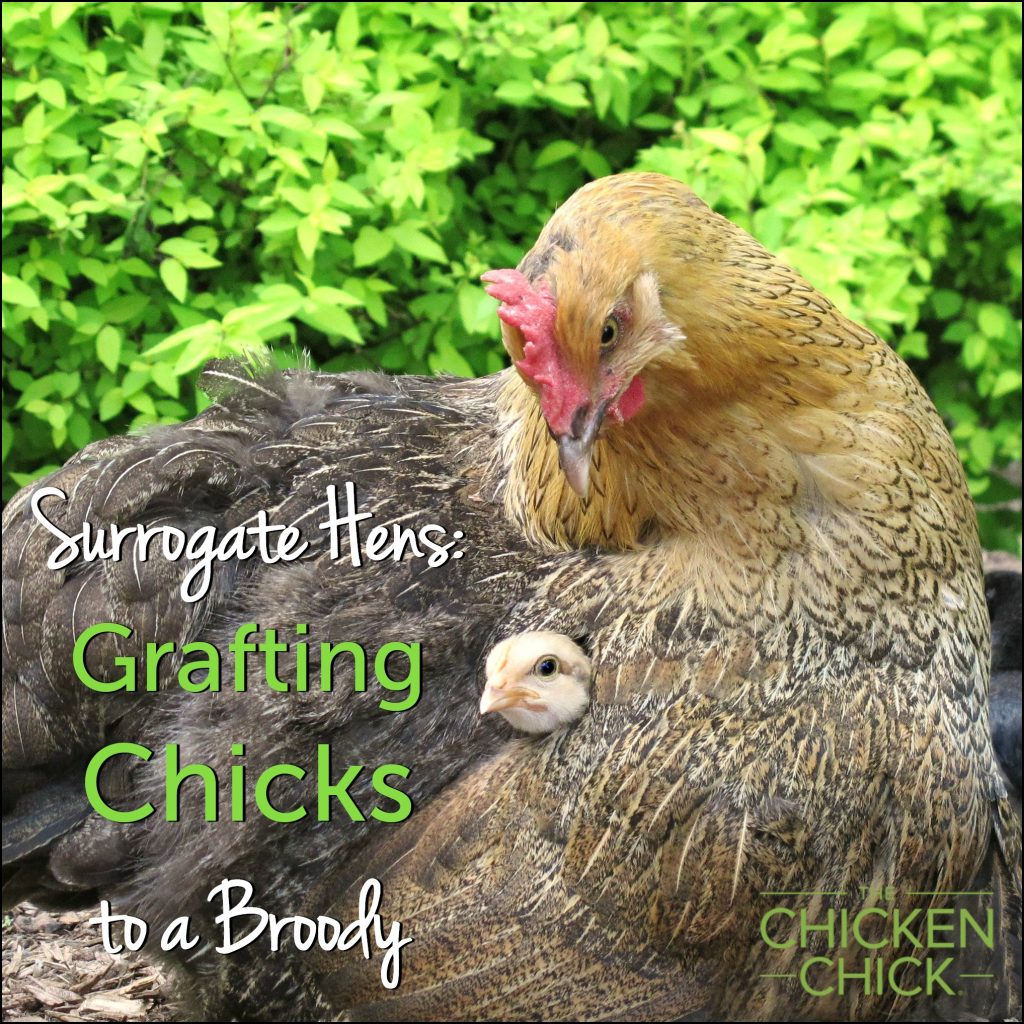
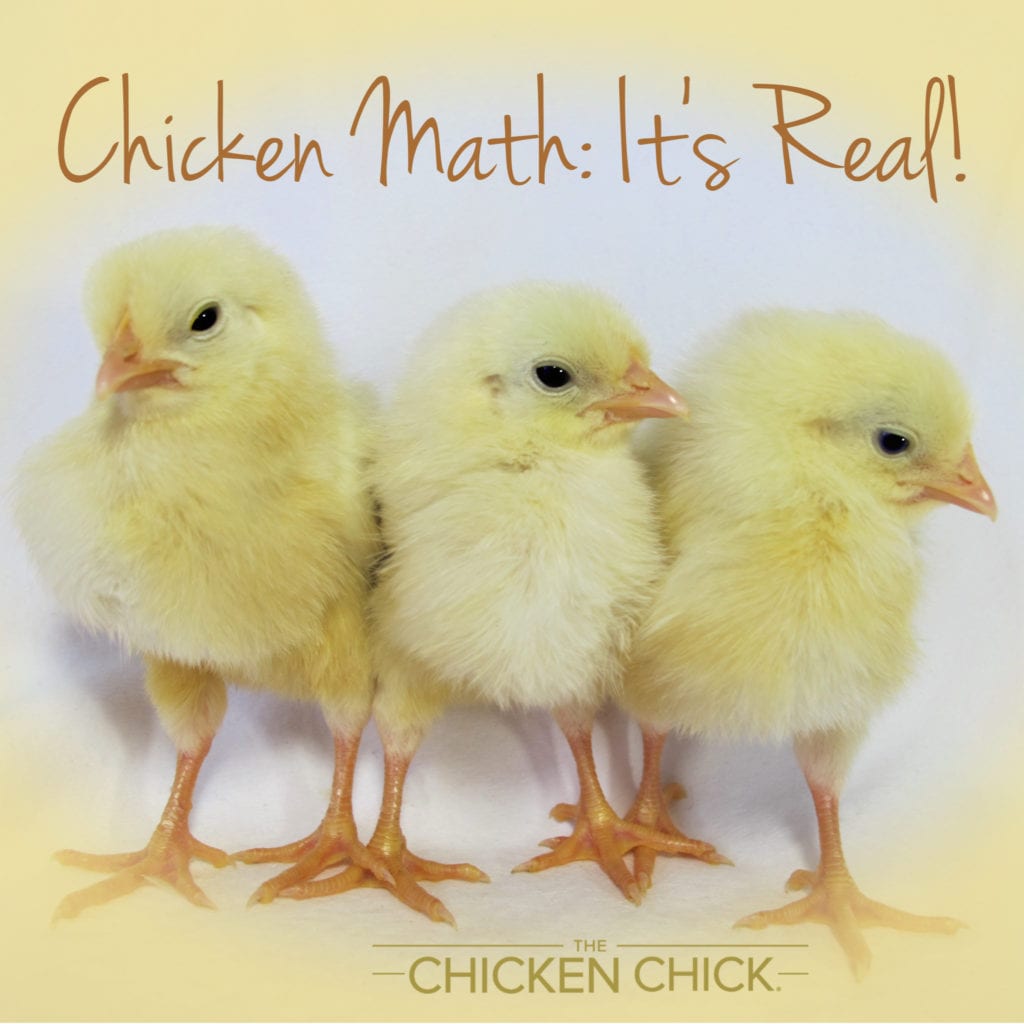









I was moments away from over-engineering a PVC feeder, then thought I’d turn to all mighty Google for answers and stumbled across your design. Simple and looks to be extremely affective and durable. My chickens and I thank you :)
Thanks Mama T! :)
Thanks Paul. I've got to do somthing worthwhile with this law degree! ;)
If you'd like to discuss some other ideas I have that involve your company, I'd love to speak with you about them.
service@CustomEggCartonLabels.com
Kathy
Nice Job!! You're pretty smart! Very Impressive. Paul Boutiette, President/CEO EggCartons.com
Great idea, I love it!